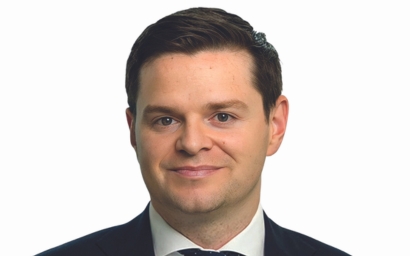Irish-domiciled sustainability-related funds are growing hugely – but Maples lawyer Ian Conlon tells Nick Fitzpatrick many funds need to ‘paper’ certain responsibilities into their older funds to avoid legal uncertainty.
Sustainable investment funds are launching at a greater pace across fund domiciles such as Ireland, where about a quarter of funds are now categorised in line with EU rules on sustainability disclosures, according to recent research.
The amount of Irish-domiciled sustainability-related funds that are newly established has grown by over 40% in the past two years, according to data from law firm Maples Group, which analysed more than 6,400 funds in Ireland.
The firm found that 23% of Irish-domiciled funds are now categorised as either Article 8 or Article 9 funds under the Sustainable Finance Disclosure Regulation (SFDR).
Ireland has €3.74 trillion of assets under administration and is the second-largest cross-border fund hub after Luxembourg, with more than €5 trillion of assets under administration. Ireland and Luxembourg both have ambitions to become ‘green hubs’ for sustainable investments, and Maples’ research says the increasing number of sustainable funds in Ireland is consistent with growth in other fund domiciles.
“Someone might say that ‘only’ 23% of Ireland’s funds are sustainable, but the real powerful statistic from our research is that over 40% of new funds that are being established are sustainable funds.”
Ian Conlon, a partner in the fund and asset management practice at Maples Group in Dublin, says that the growth in Ireland’s sustainable funds sector suggests that ESG funds will reach US$34 trillion of assets by 2026, as predicted by consultancy PwC, with Europe holding half that volume.
Article 9 funds offer the highest level of focus on sustainability, but only 3% of Irish-domiciled funds have Article 9 status, and just 15% of those hold investments consistent with the EU’s green taxonomy.
“Someone might say that ‘only’ 23% of Ireland’s funds are sustainable, but the real powerful statistic from our research is that over 40% of new funds that are being established are sustainable funds,” says Conlon. “I’m very confident in saying that this number will dramatically increase over the next five to ten years.”
He argues that the rise in sustainable funds shows that the EU Sustainability Action Plan – introduced in 2018 and now the European Green Deal – is working.
Peter Stapleton, Maples’ global ESG lead, adds: “We are quite bullish around the growth of sustainable funds in Ireland” and says that the development of Ireland as a global hub is a core focus of the Irish government’s Ireland for Finance Strategy.
Greenwashing caution
Accusations of greenwashing in the UK and EU funds industry have been levelled at firms. Germany’s DWS is probably the most well-known example and a wave of caution following greenwashing allegations is thought to be partly behind some fund managers reclassifying their Article 9 funds to Article 8, which have a lower level of sustainability requirements under the SFDR. Morningstar found that some 40% of funds were downgraded by asset managers from Article 9 to Article 8 categorisation in the final three months of 2022.
 According to Conlon, greater clarity from the European Commission about the definition of sustainability in April this year will bolster confidence at asset management firms that want to offer Article 9 funds. Even greater confidence will follow the first reporting round next year under the Corporate Sustainability Reporting Directive (CSRD), which will increase transparency about the sustainability of companies that Article 9 funds might invest in.
According to Conlon, greater clarity from the European Commission about the definition of sustainability in April this year will bolster confidence at asset management firms that want to offer Article 9 funds. Even greater confidence will follow the first reporting round next year under the Corporate Sustainability Reporting Directive (CSRD), which will increase transparency about the sustainability of companies that Article 9 funds might invest in.
“We have clients who feel they are more EU taxonomy aligned, but they may be adopting a prudent and sensible approach because they cannot be confident right now based on the quality of the data available,” says Conlon.
Who does the papering?
Responsibility for a sustainability-focused fund’s compliance with the SFDR primarily sits with the management company – the regulated entity of a fund, known in the industry as the ‘ManCo’. In a multi-manager context, which is the prevalent model in the European fund space, it is “crucial that the relevant party responsible for SFDR compliance is identified”, Conlon says.
Due to this, pre-SFDR fund management agreements may need “re-papering” to clarify responsibilities. Conlon says it’s important that the management agreement in place between a ManCo and a delegate investment manager clearly outlines the responsible party for SFDR compliance.
“If a ManCo did not revisit their management agreements upon the introduction of SFDR, there are potential gaps that need papering. Otherwise, responsibility for SFDR compliance will default to the ManCo,” he says. “So, the impetus for the clarification of these responsibilities lies with the ManCos. When something goes wrong, the parties could become entrenched if they have not contracted who is responsible for SFDR compliance.”
“If a ManCo did not revisit their management agreements upon the introduction of SFDR, there are potentially gaps that need papering. Otherwise, responsibility for SFDR compliance will default to the ManCo.”
The third-party ManCo market – where the management company entity is outsourced – has seen huge growth in recent years, both in Ireland and Luxembourg.
Fund administration firms or legal firms, including Maples, are the main providers of these services.
In its research, Maples found that third-party ManCos manage 35% of all Irish-domiciled funds and in aggregate manage approximately 25% of all Irish-domiciled Article 8 and Article 9 funds. Conlon says these providers were shown to be placing reliance on delegate investment managers for SFDR compliance.
Website disclosures
More broadly, the Maples report notes that there needs to be a focus on SFDR website disclosure content and location rules – i.e., that the sustainability disclosures are located in the appropriate area of the website that is labelled ‘Sustainability-related Disclosures’.
Maples studied the websites of the top 30 managers in Ireland and found a high level of compliance with sustainability disclosures. However, the disclosures were not always located under a dedicated ‘Sustainability-related Disclosures’ section, meaning finding a firm’s disclosures could be “challenging”.
© 2023 funds europe





